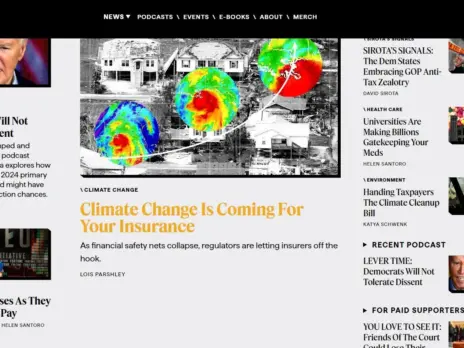
Launched in 2005 and 2006 respectively, it wasn’t long ago that Huffpost and Buzzfeed were considered to be two of the fastest-growing and most promising new journalism operations in the western world.
This week, after years of missed financial targets and enforced cutbacks, the two giants of digital journalism announced they are to merge.
The deal is part of a “wider strategic partnership” meaning Verizon is now a minority shareholder in Buzzfeed and the companies will share resources in areas like advertising, which should help both cut costs.
Below, we timeline the rise and fall of both Huffpost and Buzzfeed as they prepare to face the future challenges of digital journalism side by side.
We find that, as well as facing financial troubles, both news websites have struggled to maintain traffic levels in recent times, adding to their woes.
Buzzfeed’s monthly readers were down 23% year-on-year in October, while Huffpost US has seen a decline of 45% in the past three years.
Timeline of the brands
May 2005
A team headed by Arianna Huffington – and including Jonah Peretti who would later co-found Buzzfeed – launches Huffington Post, which starts out with a model based around aggregation and contributions from unpaid bloggers. Fifteen years later the brand has 15 international newsrooms and editions.
November 2006
Peretti (pictured) launches Buzzfeed with a focus on viral content. Fourteen years later, it has 14 offices and 1,100 employees around the world with related brands including the viral food brand Tasty.
February 2011
AOL buys Huffington Post, now claiming around 25m visitors a month, for $315m. AOL is bought by Verizon four years later.
December 2011
Politico’s Ben Smith is named Buzzfeed News editor-in-chief, marking the publisher’s move into serious journalism. Smith stays until January 2020 when he moves to the New York Times as media columnist.
April 2012
Huffington Post wins Pulitzer Prize in National Reporting in the US for senior military correspondent David Wood’s work on the lives of severely wounded veterans and their families. It is the first commercial digital media company in the US to win the prize.
March 2013
Buzzfeed opens an office in London and sees 400% growth in UK unique user numbers within six months.
September 2013
Huffington Post bans anonymous comments in a bid to stifle trolls. Its 40 comment moderators had been kept busy dealing with 25,000 comments an hour, most of which were anonymous. It wanted them to instead be able to engage more with the community.
August 2015
NBC Universal invests $200m in Buzzfeed, followed by a further $200m the following year. The second investment gave the publisher a valuation of about $1.6bn.
January 2016
Huffington Post gets major recognition with guest editorship from Duchess of Cambridge.
August 2016
Arianna Huffington steps down as editor-in-chief of Huffington Post despite thinking it would be her “last act”.
April 2017
Huffington Post relaunches as Huffpost alongside its first global website redesign.
January 2018
Huffpost US closes its contributor platform, ending its original unpaid blogging model which had proved controversial. It is replaced with new opinion and personal sections anchored around paid commissions. The UK site follows suit in July 2019.
Buzzfeed UK makes about 45 redundancies including in the news, buzz, commercial and admin teams as it shifts to focus on content for global audiences and the core UK news beats of investigations, politics, media and social justice.
It comes after Buzzfeed missed its revenue target by $90m in 2017.
July 2018
Buzzfeed UK’s editorial team votes against union recognition 18 months after its NUJ chapel first went to bosses with the request and Peretti said he did not think the move was “in the best interests of Buzzfeed or our employees”. The vote instead favoured a direct relationship with management. The company voluntarily gives recognition to US staff a year later.
August 2018
Buzzfeed News begins asking readers for donations in a Guardian-style experiment to help it “report more news”.
December 2018
Verizon cuts the value of its media brands, including Huffpost and Yahoo, to $200m.
January 2019
Huffpost owner Verizon lays off 7% of staff including Huffpost journalists such as 2015 Pulitzer-finalist Jason Cherkis.
Buzzfeed cuts 15% of its workforce, or around 250 jobs. Peretti tells staff “revenue growth by itself isn’t enough to be successful in the long run”.
“The restructuring we are undertaking will reduce our costs and improve our operating model so we can thrive and control our own destiny, without ever needing to raise funding again.
“These changes will allow us to be the clear winner in the market as the economics of digital media continue to improve.”
In the UK, the cuts mean the editorial team is almost halved from 37 to 20 London-based journalists.
March 2019
Buzzfeed wins major libel suit brought against it by news agency boss Michael Leidig, who the website dubbed “the king of bullshit news” in 2015. Buzzfeed later wins again on appeal.
April 2019
Huffpost US rolls out membership scheme offering access to ad-free pages and exclusive newsletters for $5.99 a month.
October 2019
Verizon reportedly begins trying to find a buyer for Huffpost.
May 2020
Buzzfeed announces plans to close its dedicated news operations in the UK and Australia for economic and strategic reasons after the Covid-19 pandemic hits the industry around the world. About ten journalists are made redundant in the UK but some London-based staff remain to write global celebrity, social and investigations news for the American audience.
September 2020
New York Post reports Verizon is struggling to offload Huffpost despite approaching multiple digital media companies.
November 2020
Buzzfeed agrees a deal to buy Huffpost as part of a “wider strategic partnership” with Verizon Media, which will become a minority shareholder in Peretti’s company.
The current picture: website traffic declines
Financial sustainability aside, how are Buzzfeed and Huffpost performing, and how do they compare?
According to Comscore figures provided by Buzzfeed, its website attracted 69m visitors last month, compared with Huffpost’s 36m.
However, Buzzfeed’s traffic was down from 89.3m in October 2019, while Huffpost was steadier, down by 5% from 38m.
Huffpost’s traffic has dropped 45% in the US over the past three years, according to Comscore’s full Media Trend report.
The graph below compares the scale of Huffpost in the US and the UK – but the figures for the UK cover the entire Yahoo-Huffpost News Network meaning the actual Huffpost website is likely to be much lower. Yahoo News carries a mixture of original and aggregated content.
The following graph shows Buzzfeed News’ scale in the US compared to the UK, per Comscore figures. The US website saw a massive spike in traffic in March, which we have previously reported was the peak of interest in Covid-19 news.
Picture: Reuters/Lucy Nicholson
Email pged@pressgazette.co.uk to point out mistakes, provide story tips or send in a letter for publication on our "Letters Page" blog






